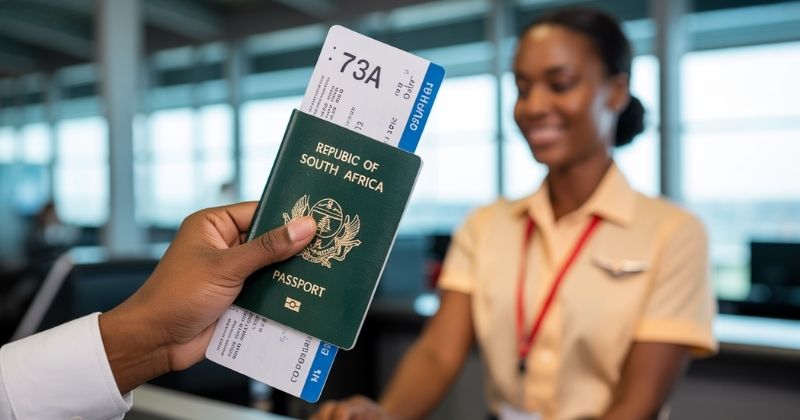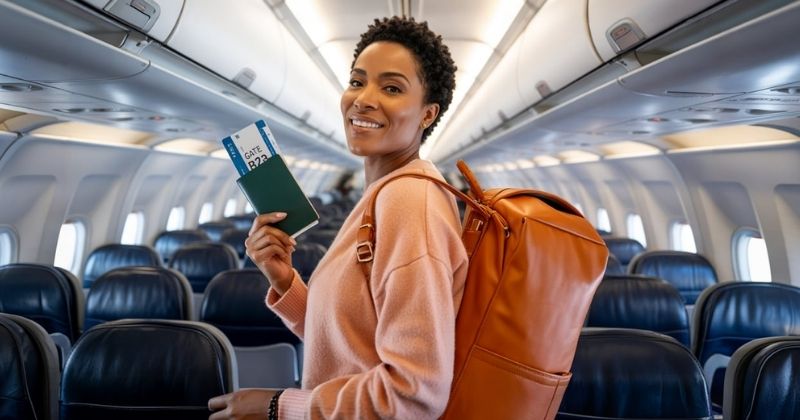
South Africa has made a notable return to the upper half of the global passport rankings, reclaiming a spot among the world’s 50 strongest passports for the first time since 2014. According to the latest update from the Henley Passport Index, the country now ranks 48th globally, climbing from its previous 53rd position in 2024. This movement is particularly significant, as the last time South Africa officially held a place within the top 50 was over a decade ago. This marks a symbolic win for South Africans hoping for stronger global mobility and improved recognition of their travel credentials.
Key Takeaways
- South Africa Re-Enters the Top 50: South Africa has returned to the top 50 in the Henley Passport Index for the first time since 2014, now ranking 48th globally. This improvement is largely due to declines in other countries’ rankings, rather than expanded visa access for South Africans.
- Limited but Stable Visa-Free Access: South African passport holders currently enjoy visa-free or visa-on-arrival access to 103 countries. However, recent losses such as Ireland and Nigeria reflect tightening controls and reduced flexibility.
- Mixed Global Perception: While Henley’s ranking shows a modest climb, Nomad Capitalist ranks South Africa’s passport 100th due to poor global perception, restrictive tax policy, and limited personal freedom. These broader factors weigh down the passport’s overall appeal for global mobility and investment.
About Arcadia Finance
Finding a loan shouldn’t be stressful. Arcadia Finance connects you to 19 reputable NCR-compliant lenders with no application fees. Simple, reliable, and tailored to suit you.
How the Henley Passport Index Works
The Henley Passport Index compares the visa-free access offered by 199 passports to a total of 227 global destinations. This widely recognised index is underpinned by exclusive data sourced from the International Air Transport Association (IATA), which operates the most comprehensive and accurate travel database in the world. Additional research and analysis are conducted by the Henley & Partners research team to provide updated rankings.
The data is constantly monitored and updated to reflect real-time changes in visa agreements and geopolitical shifts, making it a closely watched tool by travellers, investors, and policymakers alike.
In this index, a passport receives a score of 1 if its holders can travel to a destination without requiring a visa, or if they can obtain a visa on arrival, a visitor’s permit, or an electronic travel authority (ETA) upon entry. If travellers must apply for a visa prior to departure or secure government-approved pre-departure clearance, the passport receives a score of 0 for that specific country. This scoring mechanism ensures a clear comparison of travel freedom among different nationalities. It reflects not just the quantity of visa-free destinations, but also the convenience and level of hassle travellers can expect at international borders.

Singapore and Other Top Performers Continue to Dominate
Singapore has maintained its top position as the strongest passport in the world, offering visa-free access to an impressive 193 destinations. Japan and South Korea share the second spot, each allowing travel to 190 destinations without prior visa requirements. A group of European countries, including Denmark, Finland, France, Germany, Ireland, Italy, and Spain, share third place, offering their citizens visa-free entry to 189 countries.
These rankings highlight the growing strength of Asian and European nations in international diplomacy and mobility agreements.
South Africa’s Shift in Ranking
South Africa’s climb back into the top 50 has not been the result of an increase in its own travel privileges but is rather due to changes in the positions of other countries. The passport currently allows visa-free access to 103 destinations, although this number has declined in recent years. Notably, South Africa lost visa-free access to Ireland and Nigeria, which has impacted the overall travel convenience for its citizens. Even so, regaining its place in the top 50 signals resilience amid tightening visa requirements and a global shift towards stricter immigration controls.
Earlier this year, South Africa began in 48th position during a periodic review but briefly slipped down the list. This recent return to the top 50 is the first time the country has achieved this status in the official mid-year rankings since 2014. In that year, the South African passport held the 41st spot, before falling to 53rd in 2015. Despite temporary improvements, sustained recovery in rankings has been limited due to ongoing issues around visa-free entry.
This up-and-down movement illustrates the fragility of international mobility status and how quickly countries can lose ground without consistent diplomatic engagement.
Reasons Behind the Loss of Visa-Free Access
Ireland revoked visa-free entry for South Africans as a response to increased incidents of fraudulent passports being used to enter the country. Meanwhile, Nigeria shifted to an e-visa system, citing concerns over illicit trade activities between the two nations. These developments have contributed to the stagnation in South Africa’s travel privileges, even as other nations have expanded their global access. These setbacks underline the urgent need for reforms in passport security, border control collaboration, and anti-fraud measures to rebuild international trust.
How South Africa Compares to Other Countries
According to the 2025 rankings, countries like Turkiye and Russia, which rank 46th, offer access to 114 destinations. Qatar, placed 47th, allows entry to 112 countries. South Africa’s 48th position grants access to 103 destinations, just ahead of Belize (102 destinations) and Kuwait (100 destinations). At the lower end of the rankings, Syria and Afghanistan occupy the last two spots with only 27 and 25 visa-free destinations, respectively.
South Africa remains in a competitive but fragile position, and further downward shifts could impact business travellers, students, and families alike.
An Alternative View: The Nomad Capitalist Rankings
Another perspective is offered by Nomad Capitalist, a consultancy firm that ranks passports based on broader criteria beyond just visa-free access. While South Africa saw a slight increase in its score, from 67 in 2024 to 68.5 in 2025, it remains at the 100th position in their rankings. This system evaluates passports using five key indicators: visa-free travel (50 percent), tax obligations (20 percent), global reputation (10 percent), eligibility for dual citizenship (10 percent), and personal freedom (10 percent). This broader framework paints a less flattering picture of the South African passport’s utility and desirability for global mobility and wealth planning.
Despite the improved score, South Africa’s ranking remains low due to ongoing travel restrictions, limited global perception, and constrained personal freedom compared to higher-ranking nations. For context, Ireland topped the Nomad Capitalist rankings with a total score of 109.0, illustrating the gap between South Africa and countries with more favourable travel and economic policies. These figures reveal a growing divide between passports that open doors to global opportunity and those that are slowly losing influence on the world stage.

List of 103 Countries South Africans Can Access Without a Visa
| Region | Countries | Notes |
|---|---|---|
| Africa | Angola, Benin, Botswana, Burundi, Cape Verde Islands, Comoro Islands, Djibouti, Ethiopia, Egypt, eSwatini, Gabon, Ghana, Guinea-Bissau, Kenya, Lesotho, Madagascar, Malawi, Mauritius, Mozambique, Namibia, Reunion, Rwanda, Senegal, Seychelles, Sierra Leone, Somalia, Tanzania, The Gambia, Tunisia, Zambia, Zimbabwe | Crucial regional partners highlighting mobility cooperation within the continent. |
| Americas | Argentina, Belize, Bolivia*, Brazil, Chile, Costa Rica, Ecuador, El Salvador, Falkland Islands, Guatemala, Guyana, Honduras, Nicaragua, Panama, Paraguay, Peru, Uruguay, Venezuela | Many Latin American nations offer visa-free access, enhancing trade, education, and tourism opportunities. |
| Asia | Cambodia*, Hong Kong (SAR China), Indonesia, Kyrgyzstan*, Laos*, Malaysia, Maldives*, Macao (SAR China), Nepal*, Philippines, Singapore, Sri Lanka*, Tajikistan*, Thailand, Timor-Leste*, South Korea** | Popular for travel and business, though access to countries like China and India remains restricted. |
| Caribbean | Antigua and Barbuda, Bahamas, Barbados, British Virgin Islands, Cayman Islands, Dominica, Dominican Republic, Grenada, Haiti, Jamaica, Montserrat, St. Helena*, St. Kitts and Nevis, St. Lucia, St. Vincent and the Grenadines, Trinidad and Tobago, Turks and Caicos | Visa-free access supports both tourism and potential offshore business ventures. |
| Europe | Georgia, Kosovo, Russian Federation | Limited European access. Schengen states still require a formal visa. |
| Middle East | Armenia*, Iran*, Israel*, Jordan*, Oman, Palestine, Qatar, Saudi Arabia* | Strong ties allow for travel related to pilgrimage, employment, and investment. |
| Oceania | Cook Islands, Fiji, Kiribati, Marshall Islands*, Micronesia, Niue, Palau Islands*, Samoa*, Tuvalu*, Vanuatu | Pacific nations offer niche opportunities in travel, energy, and blue economy sectors. |
**Only for certain categories or short stays
Conclusion
South Africa’s return to the top 50 of the Henley Passport Index offers a symbolic boost in global mobility standing, but the progress masks underlying issues. The number of visa-free destinations remains unchanged, and recent losses in access highlight growing international scrutiny and administrative tightening. While this modest ranking climb provides positive optics, long-term improvements in passport strength will likely depend on diplomatic efforts, improved border integrity, and stronger global partnerships.
Fast, uncomplicated, and trustworthy loan comparisons
At Arcadia Finance, you can compare loan offers from multiple lenders with no obligation and free of charge. Get a clear overview of your options and choose the best deal for you.
Fill out our form today to easily compare interest rates from 19 banks and find the right loan for you.



